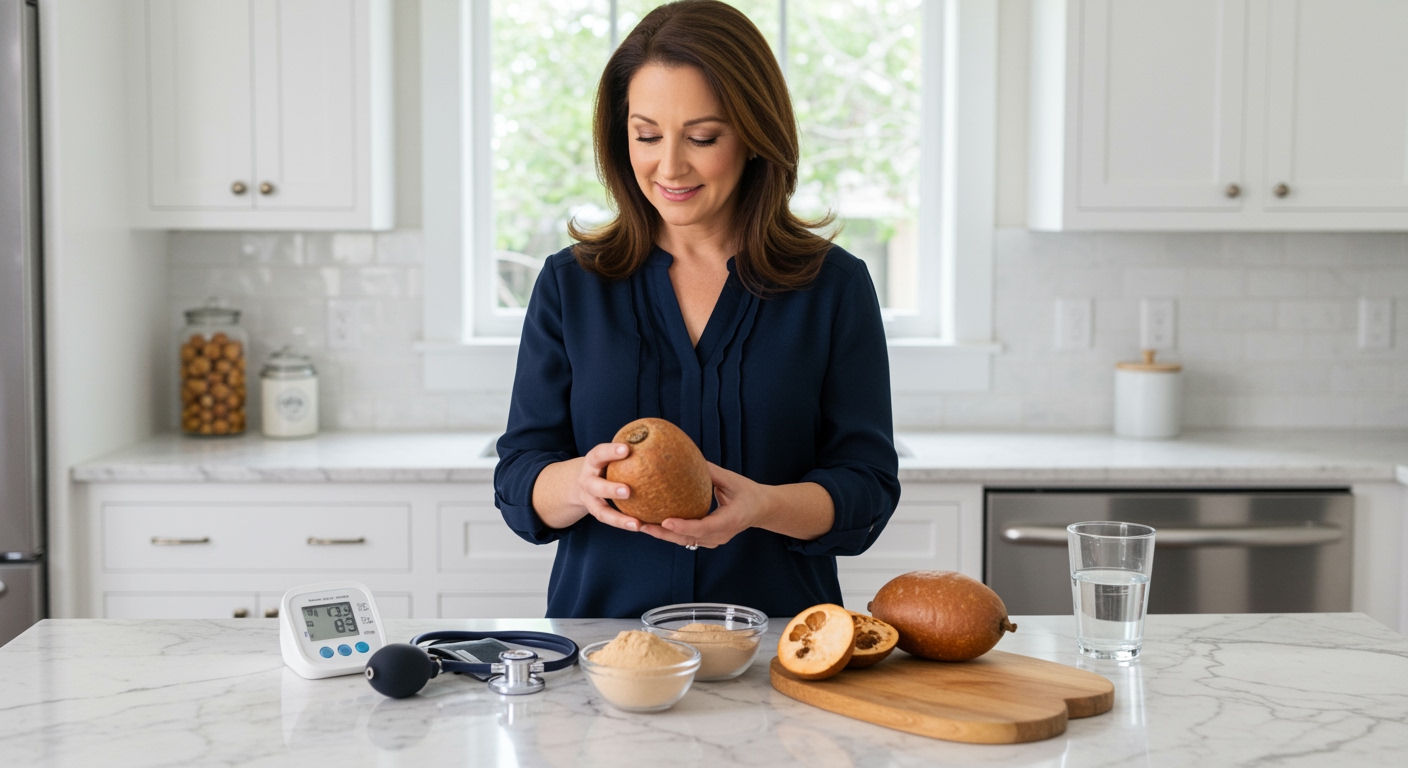✪ Key Takeaway: Baobab fruit shows promising blood pressure benefits through potassium content and antioxidants, but more human studies are needed.
Introduction
Your doctor just told you that your blood pressure numbers are climbing into dangerous territory.
You start searching for natural solutions and stumble across claims about baobab fruit being a miracle cure for high blood pressure.
Hi, I’m Abdur, your nutrition coach and today I’m going to examine the science behind baobab fruit and its potential effects on blood pressure.
What Makes Baobab Special For Blood Pressure?
Baobab fruit comes from the massive African tree known as the Tree of Life.
This ancient fruit packs an impressive nutritional profile that caught the attention of cardiovascular researchers.
The fruit contains exceptionally high levels of potassium, which plays a crucial role in blood pressure regulation.
Potassium works by helping your kidneys remove excess sodium from your bloodstream through urine.
When sodium levels drop, your blood vessels can relax and your blood pressure decreases naturally.
Baobab also contains powerful antioxidants called polyphenols that may protect your blood vessels from damage.
✪ Fact: Baobab fruit contains six times more potassium than bananas per serving.
Does Science Support These Claims?
Recent research shows promising results for baobab and cardiovascular health.
A 2021 study published in scientific journals examined baobab extract effects on blood pressure in laboratory settings.
The research found that baobab compounds helped relax blood vessels and improve circulation.
Another study focused on the antioxidant properties of baobab and their potential to reduce oxidative stress in blood vessels.
Oxidative stress occurs when harmful free radicals damage your blood vessel walls, making them stiff and narrow.
However, most current research involves animal studies or laboratory experiments rather than human clinical trials.
We need more direct human studies to confirm these cardiovascular benefits definitively.
✪ Note: Current research shows potential but lacks large-scale human clinical trials.
How Much Baobab Should You Consider?
Traditional communities in Africa consume baobab fruit as part of their regular diet without specific dosage restrictions.
Most commercial baobab powder products suggest one to two teaspoons daily mixed into smoothies or water.
This amount provides approximately 300-600 milligrams of potassium along with vitamin C and fiber.
Start with smaller amounts to assess your body’s tolerance level before increasing intake.
Some people experience mild digestive upset when introducing high-fiber foods like baobab too quickly.
Remember that baobab works best as part of an overall heart-healthy lifestyle rather than a standalone treatment.
✪ Pro Tip: Mix baobab powder into morning smoothies for easy daily consumption.
What Are The Potential Risks?
Baobab fruit is generally considered safe for most healthy adults when consumed in moderate amounts.
However, people taking blood pressure medications should exercise extra caution before adding baobab supplements.
The high potassium content could potentially interact with certain medications like ACE inhibitors or potassium-sparing diuretics.
This combination might cause potassium levels to rise too high, creating dangerous heart rhythm problems.
People with kidney disease should also be particularly careful with high-potassium foods like baobab.
Damaged kidneys cannot effectively remove excess potassium from your bloodstream, leading to serious complications.
Always consult your healthcare provider before adding any new supplement to your blood pressure management routine.
✪ Note: Check with your doctor before combining baobab with blood pressure medications.
The Bottom Line
Baobab fruit shows genuine promise for supporting healthy blood pressure through its impressive potassium content and antioxidant properties.
Nature provides powerful tools, but they work best when combined with proven lifestyle changes, not as magical quick fixes.
I would love to hear about your experiences with natural approaches to blood pressure management or any questions you might have about incorporating baobab into your routine in the comments below.
References
At NutritionCrown, we use quality and credible sources to ensure our content is accurate and trustworthy. Below are the sources referenced in creating this article:
- PubMed: Baobab Cardiovascular Research
- Healthline: Baobab Nutrition Facts
- PMC: Baobab Antioxidant Properties
- MedicineNet: Baobab Health Benefits





